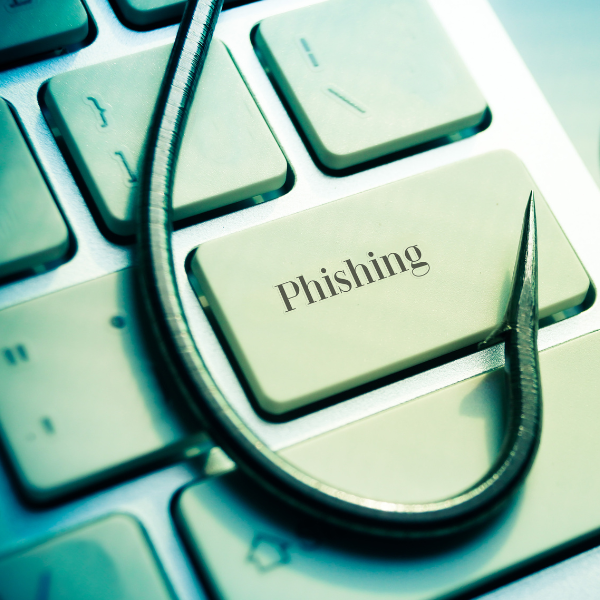Phishing Campaigns for Business Cybersecurity Management

Don’t Get Hooked, Stay Alert
In a typical workday, receiving emails asking for payments or password resets is not uncommon. Unfortunately, receiving those same requests from cybercriminals isn't unusual either. Cybersecurity management is essential in this context, as it helps protect organizations from these types of threats. Many people believe they can easily recognize a scam—a dubious email from an African prince requesting money, a message from a stranger saying you've won the lottery, or a password reset for an account you don’t have. These are easy to spot. However, cybercriminals constantly evolve in their tactics, and staying one step ahead is a continuous challenge.
Today, information travels faster and more efficiently than ever, providing cybercriminals with new opportunities to manipulate our perceptions. Can your employees distinguish between a legitimate request from you and one from an imposter? Are they cautious enough to analyze an attachment or link disguised as an Excel spreadsheet that seems to need their input?
If you're unsure of the answers to these questions, there’s an effective solution that many organizations are adopting: phishing campaigns. These campaigns are an essential part of bolstering an organization’s cybersecurity posture. Let's explore why they are crucial.
The Role of Cybersecurity Management
Modern cybersecurity management increasingly relies on regular phishing simulations. These exercises are more than just identifying which employees might click on a suspicious link; they’re about fostering a culture of awareness and vigilance. Effective cybersecurity management requires a proactive approach to protecting your company’s data and network infrastructure. By regularly testing and training your employees, you ensure that they are aware of the latest phishing techniques and equipped to handle real threats effectively. This approach helps build a resilient security infrastructure, where every employee acts as a critical line of defense against cyberattacks.
Protecting Your Network Infrastructure
Phishing simulations are vital for a comprehensive cybersecurity management strategy because they address the human aspect of security. While technical defenses like firewalls and spam filters are essential for protecting your network infrastructure, they are not foolproof. Employees must be trained to recognize and respond to phishing attempts that bypass these defenses. Regular phishing campaigns create a continuous learning environment, keeping employees updated on evolving threats and reinforcing best practices in email security. By integrating these simulations into your cybersecurity management plan, you strengthen your network infrastructure against potential breaches and enhance overall organizational security.
Click here to learn more about Solve iT’s Cyber Security Managed Services, providing clients with easy-to-digest cyber training, and helping to keep their networks safe.
Swimming in the Shallow End
According to LivingSecurity, phishing campaigns effectively raise awareness among employees by providing practical, real-life training in a consequence-free environment. There's no need to throw employees into the deep end without the knowledge needed to protect the company’s intellectual property, finances, and reputation in case of a compromise. As with any skill, practice is key to improvement.
When employees encounter simulated phishing emails, they become more vigilant in spotting suspicious messages. Even better, if they fall for a phishing simulation, there are no real consequences. Phishing simulations do not contain actual threats that could harm or infiltrate your systems. If an employee clicks on a simulated phishing link, they are typically redirected to a page that explains this was a test. They are informed that if this had been a real attack, their actions could have compromised the organization’s security. These alerts often include helpful tips on how to spot scams.
Failing a phishing simulation serves as a sobering reminder of how easy it is to be tricked by a scam. This heightened awareness significantly reduces the likelihood of employees falling victim to actual phishing attacks. Continuous phishing campaigns are recommended to sharpen staff’s recognition skills and to train new employees.
Don’t Take the Bait on a Phishy Situation
According to "Gone Phishing: The Importance of Phishing Campaigns," phishing is the most common attack method used by cybercriminals. By posing as a legitimate individual or institution, cybercriminals attempt to trick their targets into providing sensitive information or downloading malicious content. Cybercriminals continuously refine their phishing techniques, making it challenging for technical safeguards like spam filters to detect and keep them out of your employees’ inboxes. This means employees are on the front lines of protecting your network and must be trained to properly identify phishing emails. Sending employees fake phishing emails is an excellent way to test their ability to spot these potentially malicious messages consistently.
As cybercriminals continue to advance their tactics to bypass your company's defenses, it is crucial to provide ongoing training and phishing education. Regular training helps employees become adept at recognizing phishing scams, making it second nature to identify suspicious emails and significantly reducing the risk of a security incident.
However, phishing campaigns should be implemented thoughtfully to avoid damaging trust within the organization. Focusing on testing teams rather than individuals can prevent embarrassment and maintain morale. Additionally, using gamification and rewards can make the training more engaging and effective, encouraging employees to actively participate and learn from the experience.
By incorporating cyber security management practices like regular phishing simulations and continuous training, you can build a strong culture of cybersecurity that protects against evolving threats. Through proactive management and a commitment to education, every employee becomes an essential part of your company’s defense strategy. Don’t get hooked—stay alert!

